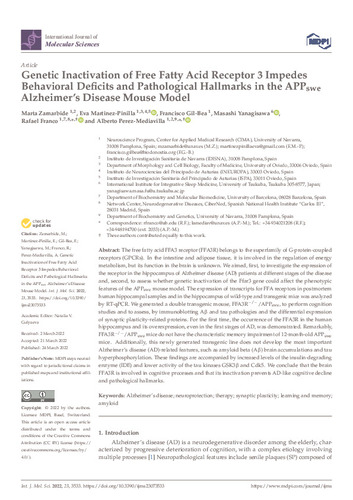Genetic Inactivation of Free Fatty Acid Receptor 3 Impedes Behavioral Deficits and Pathological Hallmarks in the APPswe Alzheimer’s Disease Mouse Model
Autor(es) y otros:
Palabra(s) clave:
Alzheimer’s disease
Neuroprotection
Therapy
Synaptic plasticity
Learning and memory
Amyloid
Fecha de publicación:
Versión del editor:
Citación:
Resumen:
The free fatty acid FFA3 receptor (FFA3R) belongs to the superfamily of G-protein-coupled receptors (GPCRs). In the intestine and adipose tissue, it is involved in the regulation of energy metabolism, but its function in the brain is unknown. We aimed, first, to investigate the expression of the receptor in the hippocampus of Alzheimer disease (AD) patients at different stages of the disease and, second, to assess whether genetic inactivation of the Ffar3 gene could affect the phenotypic features of the APPswe mouse model. The expression of transcripts for FFA receptors in postmortem human hippocampal samples and in the hippocampus of wild-type and transgenic mice was analyzed by RT-qPCR.We generated a double transgenic mouse, FFA3R//APPswe, to perform cognition studies and to assess, by immunoblotting A and tau pathologies and the differential expression of synaptic plasticity-related proteins. For the first time, the occurrence of the FFA3R in the human hippocampus and its overexpression, even in the first stages of AD, was demonstrated. Remarkably, FFA3R//APPswe mice do not have the characteristic memory impairment of 12-month-old APPswe mice. Additionally, this newly generated transgenic line does not develop the most important Alzheimer’s disease (AD)-related features, such as amyloid beta (A ) brain accumulations and tau hyperphosphorylation. These findings are accompanied by increased levels of the insulin-degrading enzyme (IDE) and lower activity of the tau kinases GSK3 and Cdk5. We conclude that the brain FFA3R is involved in cognitive processes and that its inactivation prevents AD-like cognitive decline and pathological hallmarks.
The free fatty acid FFA3 receptor (FFA3R) belongs to the superfamily of G-protein-coupled receptors (GPCRs). In the intestine and adipose tissue, it is involved in the regulation of energy metabolism, but its function in the brain is unknown. We aimed, first, to investigate the expression of the receptor in the hippocampus of Alzheimer disease (AD) patients at different stages of the disease and, second, to assess whether genetic inactivation of the Ffar3 gene could affect the phenotypic features of the APPswe mouse model. The expression of transcripts for FFA receptors in postmortem human hippocampal samples and in the hippocampus of wild-type and transgenic mice was analyzed by RT-qPCR.We generated a double transgenic mouse, FFA3R//APPswe, to perform cognition studies and to assess, by immunoblotting A and tau pathologies and the differential expression of synaptic plasticity-related proteins. For the first time, the occurrence of the FFA3R in the human hippocampus and its overexpression, even in the first stages of AD, was demonstrated. Remarkably, FFA3R//APPswe mice do not have the characteristic memory impairment of 12-month-old APPswe mice. Additionally, this newly generated transgenic line does not develop the most important Alzheimer’s disease (AD)-related features, such as amyloid beta (A ) brain accumulations and tau hyperphosphorylation. These findings are accompanied by increased levels of the insulin-degrading enzyme (IDE) and lower activity of the tau kinases GSK3 and Cdk5. We conclude that the brain FFA3R is involved in cognitive processes and that its inactivation prevents AD-like cognitive decline and pathological hallmarks.
Colecciones
- Artículos [36307]
- Investigaciones y Documentos OpenAIRE [7936]
- Morfología y Biología Celular [163]
Ficheros en el ítem





